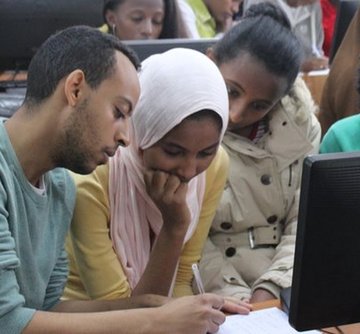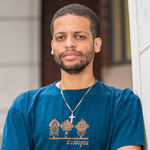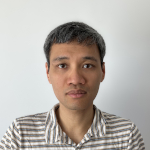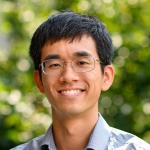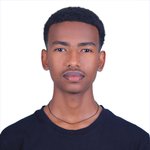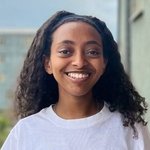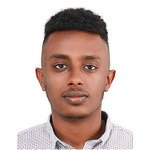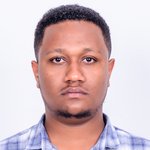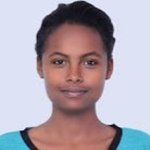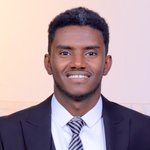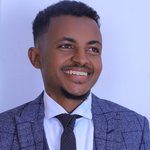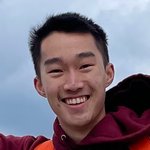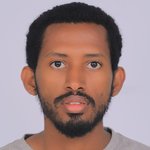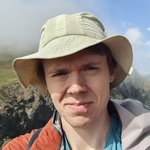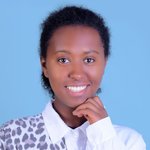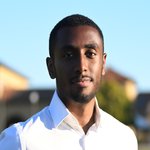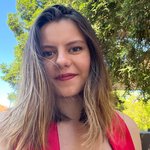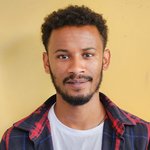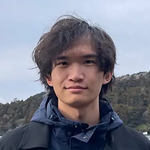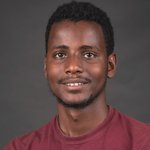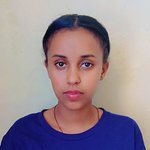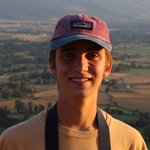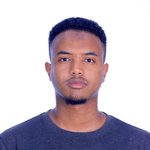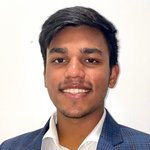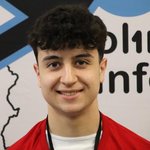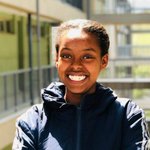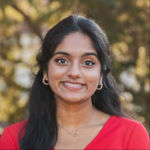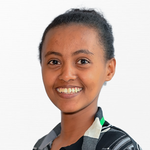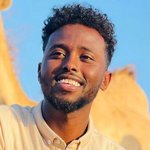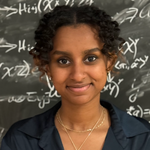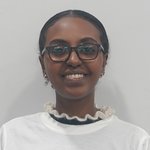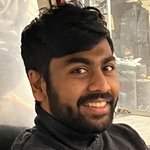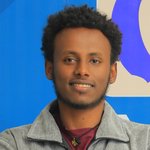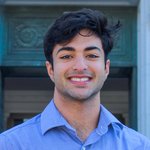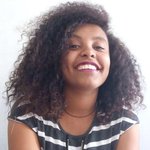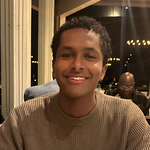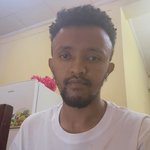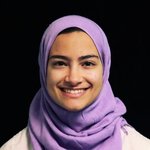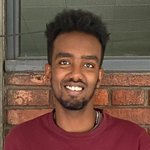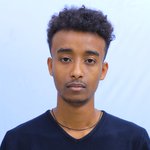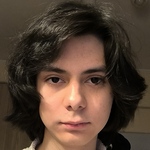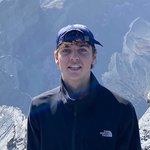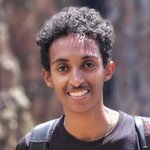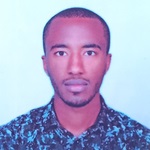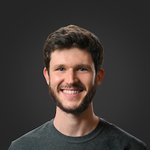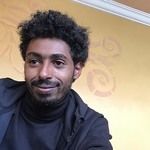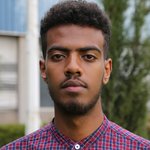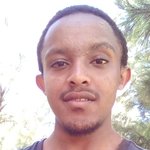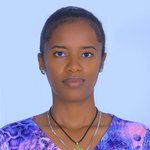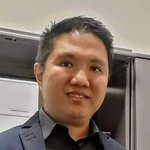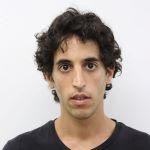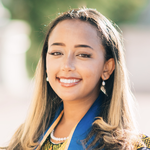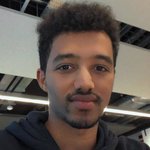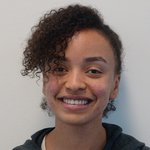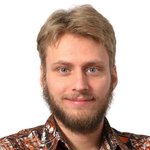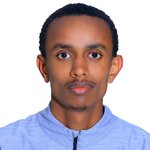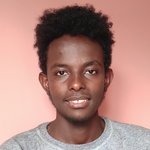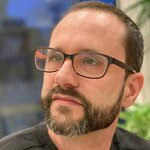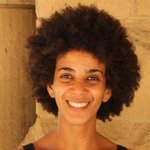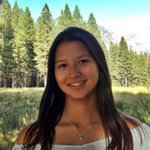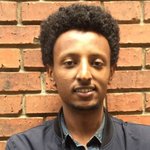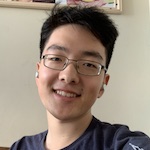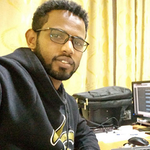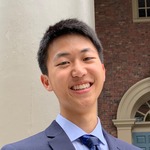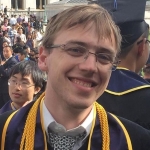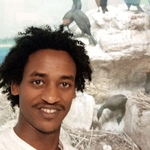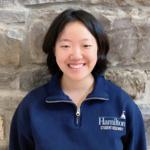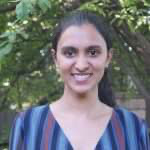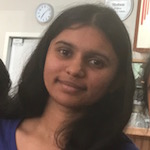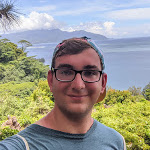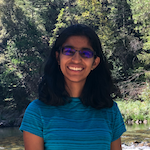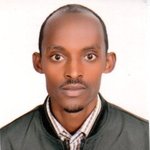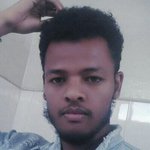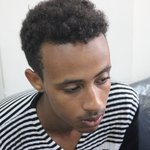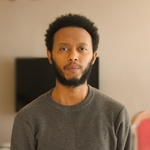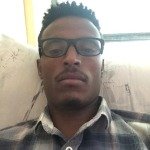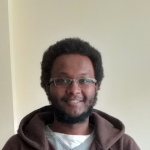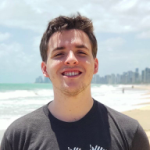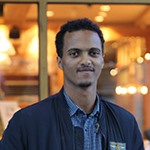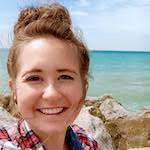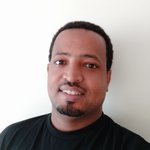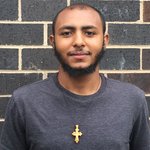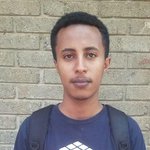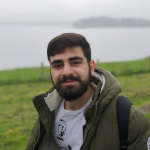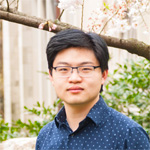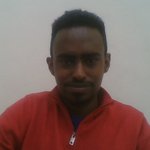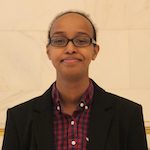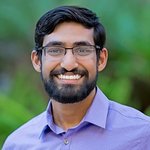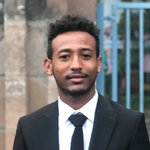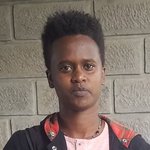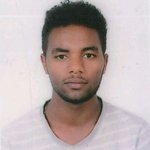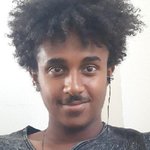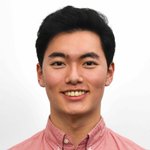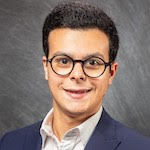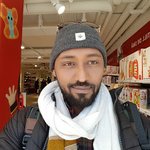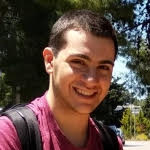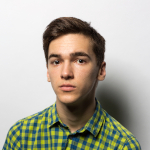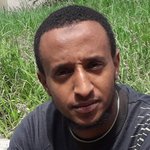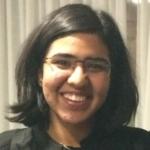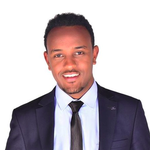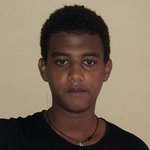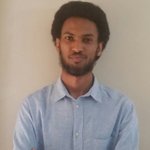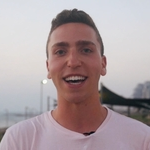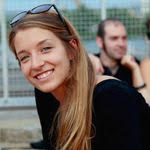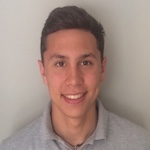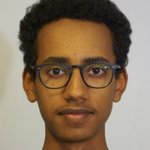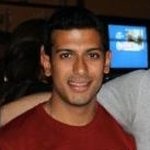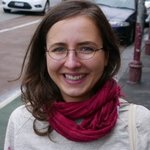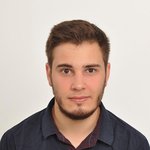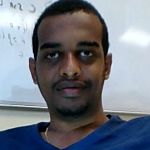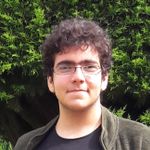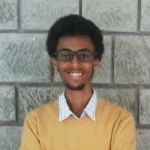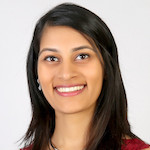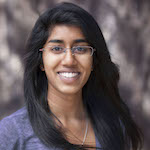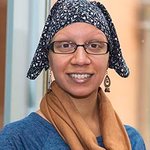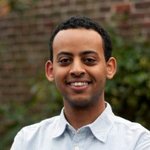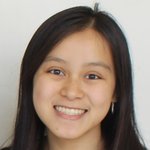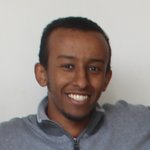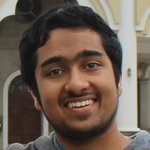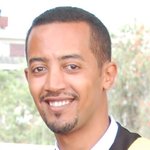| 2011 |
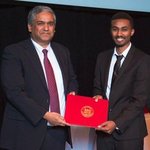 |
Addis Ababa |
MIT, M.Eng. Computer Science (‘17), S.B. Computer Science (‘16). Shalom five times served as a teaching assistant for 6.046, MIT’s main introductory course in the theory of algorithm design, once winning the MIT EECS Harold L. Hazen Teaching Award for Excellence in Teaching (pictured at left with MIT School of Engineering Dean Anantha Chandrakasan). Also, as an undergraduate, he interned twice at Facebook and once at Autodesk. After finishing his M.Eng. thesis in quantum communication under Prof. Peter Shor, Shalom now works as a software engineer at Google’s Cambridge, MA office and served as a 2019 AddisCoder teaching assistant. |
| 2011 |
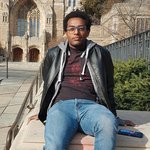 |
Addis Ababa |
NYU Abu Dhabi, B.S. Electrical Engineering (‘16). Immediately after finishing his undergraduate degree, Yilkal volunteered as a 2016 AddisCoder teaching assistant, having completed the program himself in 2011. He then worked for a year in Cambridge, United Kingdom at ARM as a Software and Modeling Engineer before beginning his Ph.D. studies in computer science at Columbia University in 2017, with research focuses in computer architecture and security. He has since left the Ph.D. program for industry, first working Google at a software engineer for 5 years before recently joining Netflix. |
| 2018 |
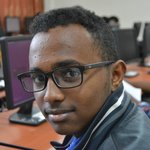 |
Bahir Dar |
Stanford University, B.S. Computer Science (‘24). Immediately after finishing AddisCoder 2018, Hailemichael along with other AddisCoder alumni Henok Ademtew and Nigusu Yenework ran a mini-version of AddisCoder ("AddisCoder Beta") in their hometown of Bahir Dar, at the local STEM center. Since graduating from Stanford, he has been working as a software engineer at Microsoft. |
| 2016 |
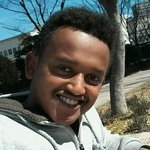 |
Harar |
Seoul National University, B.S. Computer Science and Engineering (‘22). After achieving the second highest score in his state on the Ethiopian University Entrance Exam, Dawit went on to be accepted by the European Summer Program on Rationality at King’s College London in 2017 with full financial support, though unfortunately could not attend due to being repeatedly denied a visa to enter the United Kingdom. Later in 2017, due to his strong national examination performance, the Ethiopian government selected him to apply for a competitive undergraduate scholarship program to study in South Korea. He was accepted with full scholarship to attend Seoul National University, the top university in South Korea. Before he began his studies there, his scholarship sponsored him to take Korean language courses at Silla University in Busan. Dawit now works as a software engineer at DIIANT Consulting in Seoul, South Korea |
| 2019 |
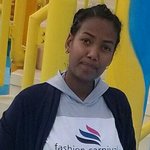 |
Shire |
KAIST, B.S.E. Computer Science (ongoing). Lwam graduated from Kallamino Special High School, a magnet school in Mek'ele that attracts top high school students from all over the Tigray region. Growing up, Lwam always wanted to be a medical doctor. Though later in high school, she realized her passion for math and physics and managed to place as a finalist in Ethiopia's first nationwide "Mind Plus Math" competition. Lwam has been an undergraduate at KAIST since Fall 2020, studying computer science. In the future, Lwam wants to create software that aides the medical field.
|
| 2011 |
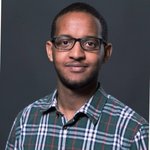 |
Addis Ababa |
RPI, Ph.D. Mathematics (‘21), M.S. Applied Mathematics (‘18). Dordt College, B.A. Mathematics (‘16). After completing his doctoral dissertation on the stochastic hydrodynamics of colonial microswimmers (e.g. modeling the movement of protozoa using tools from statistical mechanics), Yonatan completed a postdoctoral fellowship in mathematics at the University of Alberta, and is now a postdoc at WPI. |
| 2019 |
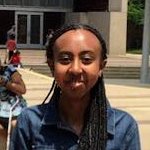 |
Addis Ababa |
Columbia University, B.S. Computer Science (ongoing). Tsigemariam joined Columbia as an undergraduate in Fall 2021, majoring in computer science with a minor in either applied math or education. She's most excited about the potential impact of technology on education. After college, she wants to work in the EdTech industry and advocate for the inclusion of Ethiopian children. Prior to participating in AddisCoder, she had her heart set on studying medicine and had never considered computer science as a potential career path.
|
| 2011 |
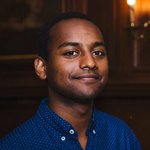 |
Addis Ababa |
Harvard University, A.B. Computer Science (‘17). While an undergraduate at Harvard, Hilawi started his own introduction to computer science course in Addis Ababa, teaching both software and web development to high schoolers. He also worked as a developer and online design director for The Harvard Crimson, the campus newspaper. Hilawi worked for several years as a software engineer focused on on data and analytics for Windows at Microsoft in Redmond, WA, and he has recently moved to Google. |
| 2011 |
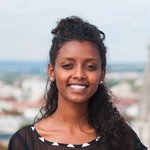 |
Addis Ababa |
University of Girona, Master's in Medical Imaging and Applications (‘19). Addis Ababa Institute of Technology, B.Sc. Electrical and Computer Engineering (‘17). Mahlet completed an Erasmus Mundus joint degree program coordinated by the University of Girona (Spain), with University of Burgundy (France) and University of Cassino and Southern Lazio (Italy) as partners. As a student in this program, Mahlet spent time in all three countries. She now works as a research software engineer in Rotterdam.
|
| 2019 |
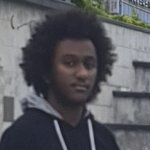 |
Addis Ababa |
UC Santa Cruz, Ph.D. Computer Science (ongoing). KAIST, B.S.E. Computer Science (‘24). Halleluyah enrolled as a Freshman at KAIST in Fall 2020 after having graduated from Lebawi Academy in Addis Ababa. Since graduating in 2024, he has been a Ph.D. student in the Computer Vision Lab, in the UC Santa Cruz Department of Computer Science and Engineering.
|
| 2016 |
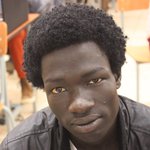 Gatluak Chol |
Akobo |
St. Paul’s Hospital Millennium Medical College, M.D. (ongoing). Gatluak was born in Akobo, a rural woreda that contains the westernmost point in Ethiopia, on the border with South Sudan. His parents were pastoralists who raised sheep, cattle, and goats. Though they never attended primary school and could not read and write, Gatluak decided to move to the capital city of his state, Gambela, and live with elder siblings to enroll in 1st grade when he was 13 years old. He first touched a computer in 10th grade at the age of 21, then participated in AddisCoder a year later. After being accepted in 2017 to the competitive St. Paul’s Medical School in Addis Ababa, he decided to enroll there and is now pursuing his M.D. |
| 2016 |
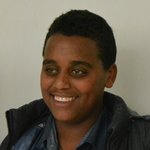 |
Dessie |
MIT, M.Eng. Electrical Engineering and Computer Science (‘24), S.B. Electrical Engineering and Computer Science (‘23), S.B. Aerospace Engineering (‘23). Yonatan has long been interested in physics, though he participated in AddisCoder after his junior year of high school out of curiosity to learn more about another technical field. Also in his junior year, he won first place in a statewide physics competition across Amhara Regional State, a state of population over 17 million. This feat earned him a free trip to South Africa to visit the South African National Space Agency. After his senior year, he then went on to earn the third highest score in the country on the 2017 Ethiopian University Entrance Exam. This led him to be featured in a 30-minute interview on Amhara TV. He spent a year as a medical student at Addis Ababa University before earning a full scholarship to study at KAIST. After a year at KAIST, he transferred to MIT. Yonatan served as a 2019 AddisCoder teaching assistant. He now works as a software engineer at Amazon Web Services. |
| 2018 |
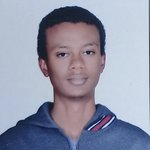 |
Eteya |
Harvard University A.B. (ongoing). Dagim is interested in UAVs, airplanes, and other flying machines. His dream is to eventually start his own aviation company. Dagim started as an undergraduate at Harvard in Fall 2021, and is pursuing a joint concentration in physics and computer science. |
| 2019 |
 |
Gambela |
Pomona College B.S. (ongoing). For most of his time at the main public high school in Gambela, Keto thought he would pursue a medical degree after graduation. After participating in AddisCoder though, his interests shifted and now he is majoring in computer science as an undergraduate at Pomona College. Keto aspires to eventually become an entrepreneur and start a successful tech company in Ethiopia. |
| 2011 |
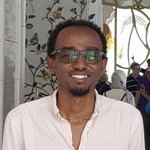 |
Addis Ababa |
Stony Brook University, Ph.D. Applied Mathematics (ongoing). NYU Abu Dhabi, B.A. Mathematics (‘16). Immediately after finishing his undergraduate degree, Derara worked on environmental fluid dynamics research at NYU for six months, then climate research at the Center for Prototype Climate Modeling for three years in Abu Dhabi. He is now pursuing his Ph.D. studies in applied mathematics at Stony Brook.
|
| 2011 |
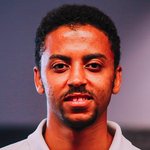 |
Addis Ababa |
University of Maryland, College Park, Master's in Telecommunications Engineering (‘19). Trinity College, B.Sc. Electrical Engineering (‘17), Physics (‘17). After earning the third highest score in the country on the 2011 Ethiopian University Entrance Exam, Barok studied at Addis Ababa Institute of Technology for a year before earning a full scholarship to attend Trinity College in Hartford, CT. There he participated in undergraduate research in computer science, and also was Chief Engineer in the university Robot Study Team and a volunteer robotics teacher to middle schoolers in Summer 2015 in Hartford. After completing his Master's degree, he worked as an application developer for the Maryland State Highway Administration for two years before starting his current job as a software engineer at Amazon. Barok is another AddisCoder alumnus who volunteered as a teaching assistant in the 2016 edition of the course. |
| 2011 |
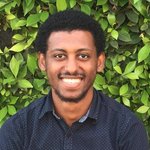 |
Addis Ababa |
University of Southern California, Ph.D. Computer Science (‘23). Trinity College, B.Sc. Computer Science (‘17). Basileal, the brother of Barok (see above), also attended Trinity College on a full scholarship. Having participated in undergraduate research in both high performance computing and robotics, Basileal then completed a Ph.D. in computer science with a research focus in privacy. He is now a postdoctoral fellow at the Princeton University Center for Information Technology Policy. Basileal served as an AddisCoder teaching assistant in 2018. |
| 2011 |
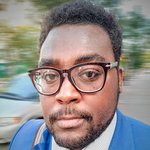 |
Addis Ababa |
Columbia University, B.S. Computer Science (‘17). As an undergraduate at Columbia, Natan founded Counseling and Test Preparation, Inc., an organization commited to training and mentoring Ethiopian high school students regarding the U.S. college admissions process. He is simultaneously Program Lead at Enza Academy, a program devoted to providing technology training to students of color. For his day job, Natan is currently a Technical Analyst, writing software at Computer Trust Corporation in Boston. |
| 2019 |
 |
Bishoftu |
MIT, S.B. Mechanical Engineering (ongoing). Having graduated as valedictorian of her high school and scoring one of the highest results in Oromia on the Ethiopian University Entrance Exam, Nebus began her ungraduate studies at MIT in Fall 2021, where she is majoring in mechanical engineering. In the future she wants to give back to her country by creating educational programs in Ethiopia that teach critical thinking and problem-solving skills to youth. |
| 2019 |
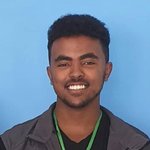 |
Addis Ababa |
MIT, S.B. (ongoing). Firaol is a graduate of Lideta Catholic Cathedral School in Addis Ababa. During his time as a high school student, he participated in several programs such as the Yale Young Global Scholars Program, and an International Astronomy and Astrophysics competition. He began his undergraduate studies at MIT in Fall 2022. |
| 2011 |
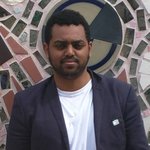 |
Addis Ababa |
Princeton University, B.S. Computer Science (‘18). Michael completed a senior thesis in computer science under Prof. Szymon Rusinkiewicz in the Princeton Graphics Group on 3D reconstruction using neural networks. He has also been a volunteer for CONTACT Princeton, a crisis and suicide prevention hotline. After graduation, Michael joined AMD as a software engineer. |
| 2016 |
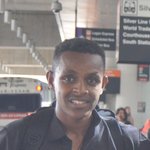 |
Debre Markos |
MIT, M.Eng. Engineering Engineering and Computer Science (‘22), S.B. Electrical Engineering and Computer Science (‘21). Yosef achieved the second highest score in the country on the 2017 Ethiopian University Entrance Exam. For this feat, like Yonatan he was also featured in a 40-minute interview on Amhara TV. He served as an AddisCoder teaching assistant in 2018. |
| 2019 |
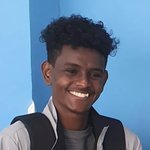 Ykealo G. Misghina |
Mek'ele |
Harvard University, A.B. (ongoing). Ykealo is Ethiopian, though was born in Serejeka, Eritrea and only moved back to Ethiopia with his mother and siblings, to the Tigray region of the country, when he was 13. The move presented several challenges — having to learn the Amharic language from zero, and taking part-time woodworking and construction jobs to help support his family while in middle and high school — but Ykealo managed to get into the elite Kallamino Special High School in Mek'ele, which admits top students from across the entire Tigray region. While there, he ranked 1st in his section every quarter of high school, and also participated in his school's robotics and soccer clubs. He and his family relocated to Addis Ababa during the Tigray War, after he had graduated from high school, and he began his undergraduate studies at Harvard in Fall 2022. |
| 2019 |
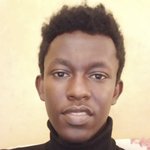 |
Bahir Dar |
Columbia University, B.S. Computer Science (ongoing). After enrolling in "AddisCoder Beta" in Bahir Dar in 2018, taught by AddisCoder'18 alumni, Bereket was accepted to and enrolled in AddisCoder 2019. Having graduated from the Bahir Dar University STEM center, he will enroll at Columbia University as a Freshman in Fall 2021. He intends to major in computer science, and possibly also mathematics. After graduation, he is thinking to start an AI-focused company in Ethiopia. |
| 2011 |
 |
Addis Ababa |
University of Oregon, Ph.D. Mechanical Engineering (ongoing). Addis Ababa Institute of Technology, B.Sc. Mechanical engineering (‘17). A maker and tinkerer, Abraham for his bachelor's thesis developed a planar CNC machine for cutting leather. He's since joined a small software startup in Addis Ababa working on unmanned aerial vehicles (UAVs), i.e. drones. He's also independently prototyped a sanitary pad dispensing machine to be used at schools. Currently, Abraham is pursuing a PhD in mechanical engineering at the Univeristy of Oregon. He served as an AddisCoder teaching assistant in 2019. |
| 2011 |
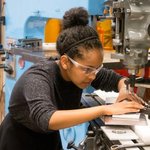 |
Addis Ababa |
Columbia University, Ph.D. Mechanical Engineering (ongoing). Princeton University, B.S.E. Mechanical and Aerospace Engineering (‘18). Fitsum participated in a number of research opportunities during her undergraduate studies at Princeton, including electrochemical engineering research on batteries, fluid mechanics research related to blood hemolysis, and the development of biomedical devices to be used in treating cancer patients. After gaining work experience and pursuing further graduate study, Fitsum is interested in starting a biotechnology company back in Ethiopia. |
| 2019 |
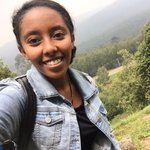 |
Addis Ababa |
Wellesley College, B.S. Physics (‘24). Mahderekal recently graduated from Wellesley College with a degree in Physics. She aspires to pursue a graduate degree then become an astronaut in the future, then to eventually open a space program in Ethiopia. |
| 2018 |
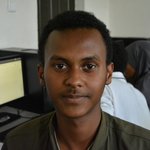 |
Adama |
Harvard University, A.B. Computer Science (ongoing). Natnael grew up in a small town called Huruta, in the Arsi zone of the Oromia region, then moved to Adama in Grade 10. Though he never thought to study computer science before joining AddisCoder, he is now a computer science concentrator at Harvard. After graduating from St. Joseph Catholic High Schoool in Adama, Natnael deferred his Freshman year at Harvard by a year due to the COVID-19 pandemic and began his undergraduate studies in Fall 2021. |
| 2011 |
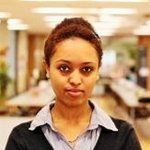 |
Addis Ababa |
Jacobs University Bremen, B.S. Computer Science (‘15). After graduating from high school, Lidiya moved to Germany for college, where she completed her undergraduate degree in computer science at Jacobs University Bremen. She then worked as a software engineer for IBM for six years before joining Amazon Web Services as a software development engineer in May 2021. |
| 2019 |
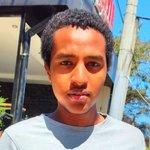 |
Addis Ababa |
NYU Abu Dhabi, B.S. Electrical Engineering and Computer Science (ongoing). Having graduated from the Cruise School, Yonathan began at NYU Abu Dhabi in Fall 2021. As a younger kid Yonathan was curious about how his toys, televisions, radios, and other electronics worked. He was also highly influenced by science fiction movies. Because of those movies, he was initially attracted to space exploration. He then later discovered his interest in technology broadly in his sophomore of high school. In the future, he would like to create a startup that focuses on the usage of data to solve problems at scale. |
| 2016 |
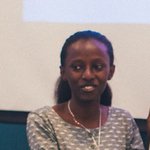 Bethelhem D. Wonbearga |
Hawassa |
Hawassa University, M.D. (‘24). Beti had no prior experience with computer science but fell in love with the subject after participating in AddisCoder 2016. After graduating as valedictorian of her class of over 1000 students at Tabor Secondary and Preparatory School in 2017, Beti participated in a summer program at Harvard on innovation, entrepreneurship, and technology before returning to Ethiopia to begin her studies toward a medical degree. |
| 2019 |
 |
Addis Ababa |
Mount Holyoke College, B.A. International Relations (‘24). Lisa recently graduated from Mount Holyoke College in 2024, with a degree in International Relations, with a focus on the Journalism, Media, and Public Discourse Nexus. Her concentration was in Global Commons. |
| 2018 |
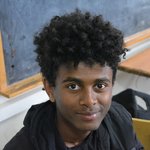 |
Bahir Dar |
Cornell University, B.S. Computer Science (‘23). As mentioned above, immediately after finishing AddisCoder 2018, Nigusu along with other AddisCoder alumni Henok Ademtew and Hailemichael Alemneh ran a mini-version of AddisCoder ("AddisCoder Beta") in their hometown of Bahir Dar, at the local STEM center. Since graduating college, he now works as a software engineer at Microsoft. |
| 2019 |
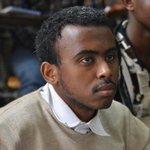 |
Bahir Dar |
Harvard University, A.B. Computer Science (ongoing). Hileamlak graduated from both Tana Haik high school and the Bahir Dar University STEM Center. It had always been Hileamlak's childhood dream to be a physicist, though after AddisCoder he decided to concentrate in computer science. He began at Harvard in Fall 2021, having deferred his start by a year due to the COVID-19 pandemic. While there, he has been pursuing entrepeneurship, working on creating a new startup. |
| 2011 |
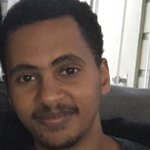 |
Addis Ababa |
Princeton University, B.S.E. Computer Science (‘16). Being interested in theoretical computer science, Michael pursued research in complexity theory with Prof. Mark Braverman before graduating in 2016. This project led to a 2019 publication in the annual Computational Complexity Conference, the main international conference focused on computational complexity theory. Like Yilkal and Barok above, Michael then volunteered as a 2016 AddisCoder teaching assistant. After graduation he worked as a software engineer at Oracle NetSuite for a couple years before joining Google to work on YouTube, then Discord, and now Libretto. |
| 2011 |
 |
Addis Ababa |
North Carolina A&T State University, Ph.D. Computer Engineering (ongoing). Addis Ababa Institute of Technology, B.Sc. Electrical and Computer Engineering (‘16). Lydia began her undergraduate studies after graduating as valedictorian of her high school. After graduating, her work with a team of other recent graduates was featured on CGTN Africa for a project that could potentially impact how waste management is handled in Ethiopia. In Fall 2019, she began her Ph.D. studies in computer engineering. |

